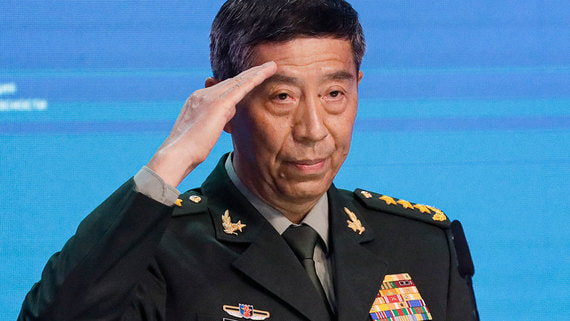China announces dismissal of Defense Minister Li Shangfu
[ad_1]

Minister of Defense and member of the Central Military Council of China Li Shangfu was officially removed from his post following a session of the Standing Committee of the National People’s Congress (NPC Standing Committee, a permanent body of parliament). The resignation was approved by Chinese President Xi Jinping. This was reported on October 24 by the state-owned Central Television of the People’s Republic of China and the Xinhua Agency without specifying the reasons. Lee’s successor has not been named. Li Shangfu was appointed minister only in March 2023.
Li, 65, last appeared in public on Aug. 29, speaking at the third China-Africa Peace and Security Forum. He was already absent from negotiations with the Commander-in-Chief of the Singapore Navy, Sean Wat, on September 4–9. In mid-September, The Washington Post and The Economist wrote about the resignation of Lee, who was allegedly under investigation for corruption. Reuters clarified that the case concerns violations in the procurement of military equipment. Along with him, eight other people are allegedly involved in the case, whom Li led from 2017 to 2022, while serving as head of the Arms Development Administration of the Central Military Council of the People’s Republic of China.
Li is not the first Chinese minister appointed in March to resign. In July, Foreign Minister Qin Gang left his post and was replaced as minister by his predecessor Wang Yi (who also holds the post of head of the office of the CPC Central Committee Foreign Affairs Commission). At the session of the NPC Standing Committee on October 24, Qin was also removed from his post as a member of the State Council. In addition, new ministers of science Yin Hejun (former deputy secretary of the CPC Party Committee of the Chinese Academy of Sciences) and finance Lan Foan (former secretary of the CPC Party Committee of Shanxi Province) were appointed. They replaced Wang Zhigang and Liu Kun, respectively, the reasons for their removal and their new place of work were not reported.
Earlier resignations also affected the army. In early August, the commander of the PLA Rocket Forces, General Li Yuchao, and his deputy, Liu Guabin, were replaced by Generals Wang Houbing and Xu Xisheng. Hong Kong’s South China Morning Post reported that the removed generals could face charges of corruption in their dealings with defense companies.
Back in the summer, Xi Jinping conducted training for members of the Politburo on issues of military management in the context of observance of the rule of law in the army and the defense industry, since the director of the Institute of Military Law of the PLA Academy of Military Sciences, Zhao Dunbing, was invited as an expert, notes senior researcher at the Institute of International Studies (IIS) of MGIMO Igor Denisov. And two days later, a notice was published on the military procurement website about the collection of evidence of violations of the law during tenders in the period after October 2017, the expert recalls. “It was at the end of September 2017 that Li Shanfu took office as head of the Armaments Development Administration. From the document it is approximately clear what he can be accused of: conflict of interest, assisting affiliated companies in obtaining contracts, bias and giving advantages to certain interests, participation in collusion, forming “closed circles” to manipulate the contract evaluation process, disclosure of confidential data,” says Denisov.
According to the expert, the removal of Lee, given such a list of sins, is purely internal in nature and has nothing to do with the desire to improve relations with the United States by removing the sanctioned minister. According to Denisov, the lack of a public justification for the resignation should not be embarrassing: to confirm accusations of corruption, a court is needed; it is preceded by a already completed party investigation, or in the case of a serviceman, a military-party investigation.
“Any corruption case is an illustrative example that the Chinese authorities are trying to make the most of, so it is worth waiting for the decision of the Discipline Inspection Commission under the Central Military Council of the CPC Central Committee, which is investigating Li’s activities. For now we are talking about the first step – the dismissal of a minister and a member of the State Council. Both in the decisions of the Standing Committee of the National People’s Congress and in the decrees of the Chairman of the People’s Republic of China, the reasons for the resignation are almost never indicated,” says Denisov. He admits that, most likely, large-scale abuses of an economic nature have already been identified and disciplinary findings will not be limited only to the former minister. At the same time, the expert does not see such a serious background in the change of ministers of finance and science on October 24 as in Lee’s resignation.
The current resignations are the consequences of the fact that the Chinese system has changed greatly in recent years, has become more centralized and vertical, and senior appointments are becoming less clear and transparent and are discussed with a much smaller number of people in the Politburo, says Alexander, head of the Center for Asia-Pacific Studies at IMEMO RAS. Lomanov. This may be due to an insufficiently thorough check of candidates before appointment – apparently, it took place after Qin and Li took up the positions and revealed relevant violations, Lomanov continues. The version about Lee’s corruption during the purchase of weapons is still unofficial, the expert points out. “At the same time, the Chinese state system is now undergoing unprecedented systematic work to strengthen security, a nationwide campaign to increase the vigilance of officials, attentiveness to state secrets and invulnerability to Western influence,” recalls Lomanov.
[ad_2]
Source link








